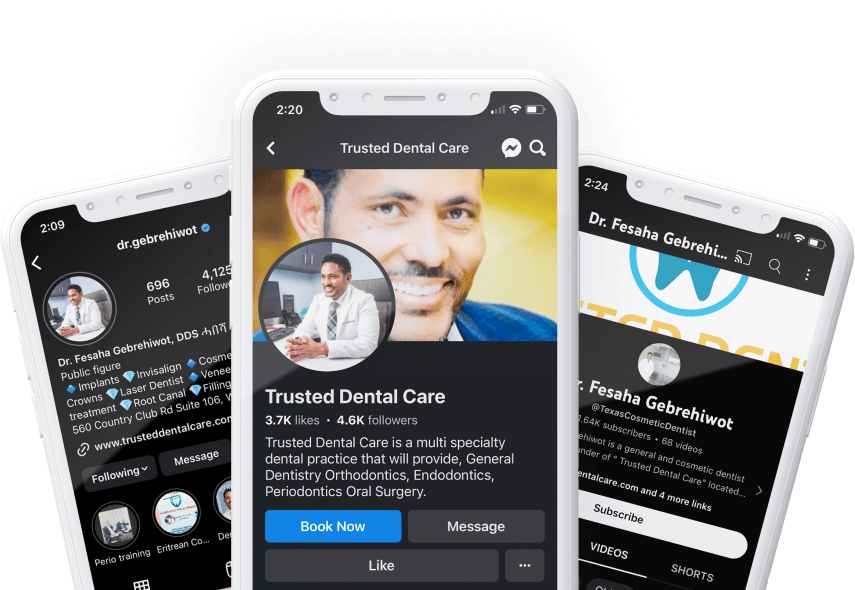Handling Dental Emergencies at Trusted Dental Care
Dental emergencies can happen unexpectedly, causing severe pain and anxiety. Knowing what to do and when to seek immediate care can make all the difference. From excruciating toothaches to sudden injuries, dental crises can be distressing and overwhelming. However, being well-informed and prepared can make all the difference when faced with such situations.
At Trusted Dental Care, Dr. G is here for all your dental needs, including dental emergencies. Learn more and don’t hesitate to reach out to our Wylie dental office for help. Call(214) 702-0446.
What Is a Dental Emergency?
A dental emergency refers to a situation where immediate attention from a dentist is crucial to alleviate pain, prevent further damage, or save a tooth. These emergencies can arise from accidents, infections, or sudden dental issues. Recognizing the signs and knowing how to respond can prevent complications and ensure the best possible outcome.

Types of Dental Emergencies You May Experience
Toothaches
Symptoms of a toothache: Severe pain, throbbing, swelling, and sensitivity to hot or cold.
What to Do:
- Rinse your mouth with warm water.
- Use dental floss to remove any food particles stuck between your teeth.
- Apply a cold compress to the outside of your cheek to reduce swelling.
- Take over-the-counter pain relievers, such as ibuprofen or acetaminophen.
- Contact our Wylie dentist immediately.
Gum Issues
Gum issues are not only painful but also concerning for your oral health. From gum infections to abscesses, these emergencies require immediate attention to prevent further complications.
- Gum Abscesses: If you notice a pimple-like bump on your gums, seek emergency dental care to drain the abscess and prevent the infection from spreading.
- Bleeding Gums: Experiencing excessive and persistent gum bleeding could indicate an underlying problem. It may be a sign of gum disease or an injury.
- Gum Infections: Infections in the gums can lead to throbbing pain and discomfort. A dental professional should evaluate the infection promptly.
Orthodontic Emergencies
Orthodontic emergencies can be challenging to handle, especially if you wear braces or aligners. Knowing how to manage these situations is crucial for maintaining the progress of your orthodontic treatment.
- Poking Wires: If a wire from your braces is poking into your cheek or gums, use a clean cotton swab or the eraser end of a pencil to gently push it into a more comfortable position.
- Loose Brackets or Bands: If a bracket or band becomes loose, stabilize it using orthodontic wax or a small piece of gauze. Avoid eating sticky or hard foods until you can get them fixed by your orthodontist.
- Discomfort from Aligners: It’s common to experience discomfort when wearing new aligners. Over-the-counter pain relievers and a soft diet can help alleviate the discomfort until your mouth adjusts to the new aligners.

Lost Dental Restorations
Losing a dental restoration can be distressing, but knowing how to handle it can make a significant difference in preserving your dental health.
- Lost Filling: If a filling falls out, use sugar-free gum or dental cement to fill the cavity temporarily. Avoid chewing on the affected tooth and schedule an emergency dental appointment to get the filling replaced.
- Lost or Broken Crown: If your dental crown comes off, gently clean it and try to reattach it using dental adhesive or toothpaste as a temporary fix. Visit our dentist as soon as possible to ensure the crown is securely repositioned.
Tooth Fractures and Cracks
Tooth fractures and cracks can occur due to trauma or biting on objects. Immediate attention is essential to prevent further damage and potential infection.
- Chipped Tooth: Rinse your mouth with warm water and apply a cold compress to reduce swelling. If possible, save any chipped fragments and seek emergency dental care to restore your tooth’s appearance and function.
- Cracked Tooth: A cracked tooth can cause sharp pain when chewing. Contact our location emergency dentist immediately for an evaluation and appropriate treatment.
- Split Tooth: A split tooth is a severe form of tooth fracture where the tooth has separated into distinct segments.
Knocked-Out Tooth (Avulsed Tooth)
Symptoms of a knocked-outtooth: A tooth that has been completely dislodged from its socket.
What to Do:
- Handle the tooth by the crown (top part) only, not the root.
- Rinse the tooth gently with water if it’s dirty, but do not scrub or remove any tissue fragments.
- Try to reinsert the tooth into its socket, or place it in a container of milk or saline solution.
- Seek emergency dental care immediately.

Jaw Injuries or Traumatic Dental Injuries
Jaw injuries can result from accidents, falls, or sports-related incidents. Prompt medical attention is vital to assess the extent of the damage.
- Jaw Fracture: If you suspect a jaw fracture, stabilize the jaw using a bandage or cloth. Apply a cold compress to reduce swelling and visit the nearest emergency room or call an ambulance for immediate medical care.
- Dislocated Jaw: A dislocated jaw can cause immense pain and limited movement. Avoid trying to relocate it yourself. Seek immediate medical attention or visit the emergency room for professional assistance.
Abscessed Tooth
Symptoms of dental abscesses: Severe toothache, swelling, fever, and swollen lymph nodes.
What to Do:
- Rinse your mouth with warm salt water to reduce bacteria and relieve pain.
- Apply a cold compress to the outside of your cheek to reduce swelling.
- Take over-the-counter pain medication.
- Contact our dentist in Wylie immediately, as an abscess requires prompt treatment to prevent serious complications.
Wisdom Teeth
Wisdom teeth, also known as third molars, can be a source of tooth pain and various dental emergencies, particularly when they don’t erupt properly.
- Impacted Wisdom Teeth: Impacted wisdom teeth can cause pain, swelling, and infections. Rinse your mouth with warm saltwater and maintain good oral hygiene. An oral surgeon should evaluate impacted wisdom teeth to determine if extraction is necessary.
- Partially Erupted Wisdom Teeth: Partially erupted wisdom teeth can create pockets where food and bacteria accumulate, leading to gum infections. Professional evaluation is essential to address the issue effectively.
Frequently Asked Questions
An acute dental emergency is a sudden and severe dental problem that requires immediate attention and intervention. These emergencies often involve severe pain, trauma, or infections that need prompt dental care to prevent further complications. Examples of acute dental emergencies include severe toothaches, knocked-out teeth, fractured jaws, or abscesses.
A dental injury during sports can include any trauma or damage to the teeth, gums, lips, cheeks, or jaw. Common examples are knocked-out teeth, fractured teeth, broken teeth, cuts to the mouth, or injuries caused by impact with sports equipment or other players.
While some bleeding can occur during some types of dental emergencies, excessive or uncontrolled bleeding is not normal. If you experience significant gum bleeding during a dental emergency, it’s important to seek immediate professional attention.
Yes, untreated dental emergencies can lead to various severe health complications. For example, an untreated infection or abscess can spread to other parts of the body, potentially causing serious health issues. Prompt treatment helps prevent complications and ensures better outcomes.
Be Prepared For Common Dental Emergencies With Our Wylie Dentist
Don’t let dental emergencies cause panic! At Trusted Dental Care, we offer emergency treatment to ensure that your oral health gets back on track. Our Wylie emergency dentist is here for you in your time of need. Call our Wylie dentist’s office at (214) 702-0446 to schedule your emergency dental care visit.